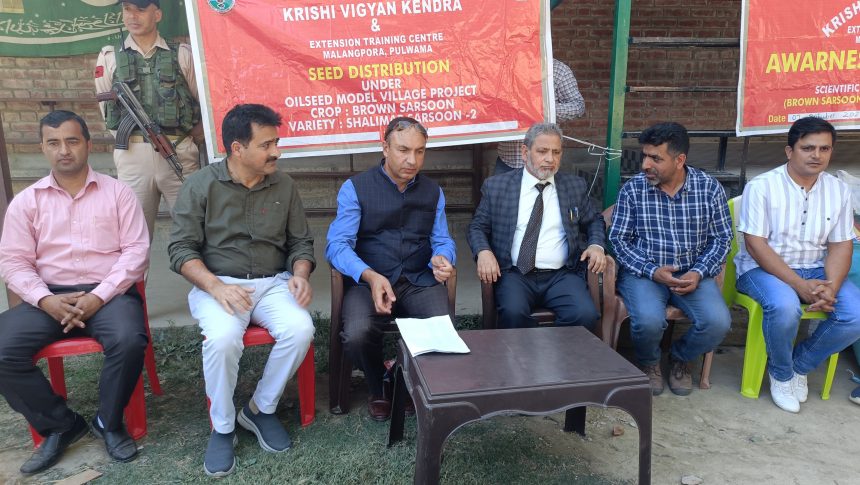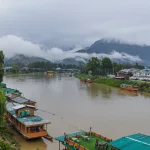Pulwama, Oct 10: Two additional villages in South Kashmir’s Pulwama district have been included under the National Food Security Mission (NFSM) on Oilseeds. This initiative, part of the Ministry of Agriculture & Farmers Welfare, Government of India, is being implemented by Sher-e-Kashmir University of Agricultural Sciences and Technology, Kashmir (SKUAST-K) through its Krishi Vigyan Kendra (KVK) Malangpora.
Dr. Javeed Ahmad Mugloo, Chief Scientist and Head of KVK Malangpora, announced that the villages of Lelhara in Kakapora block and Patalbagh in Pampore block will be developed as Oilseed Model Villages (OMV) under the NFSM. He further mentioned that a total of five villages in Pulwama, including Wagad, Pastuna, Wussan, and the newly designated Lelhara and Patalbagh, will be developed as Oilseed Model Villages.
As part of this project, scores of farmers were provided with free high-quality oilseeds of the Shalimar Sarsoon-2 (SS-2) variety, along with fertilizers and weedicides.
Dr. Javeed said that approximately 300 hectares of land have been brought under cultivation with the SS-2 mustard variety in Pulwama.
He added that, while the project benefits farmers across multiple villages, special focus is being placed on the five designated Oilseed Model Villages.
Vice Chancellor of SKUAST-K, Professor Dr. Nazir Ahmad Ganai, emphasised the importance of this project, noting that the university has undertaken this significant initiative in collaboration with the Government of India to promote mustard cultivation in Jammu and Kashmir.
“We are currently reliant on imports,” he said, stressing the need for farmers to have access to high-quality seeds, fertilizers, and chemicals.
He also confirmed that the farmers’ seed requirements have been fulfilled under the project.
The Vice Chancellor explained that Jammu and Kashmir currently faces an import bill of approximately ₹2,000 crore for mustard oil. He highlighted that expanding the area under mustard cultivation is crucial to reducing these imports.
The high-yield SS-2 mustard variety, yeilding approximately 35 kilograms per quintal and 90 kilograms per kanal, is expected to significantly boost local oilseed production. This will not only improve the livelihoods of farmers but also help reduce the region’s dependence on imports.
Dr. Javeed projected that within the next five years, Jammu and Kashmir is expected to achieve 60% self-sufficiency in oilseed production.
Two more Pulwama villages included under ‘NFSM’ on Oilseeds

Leave a Comment Leave a Comment







